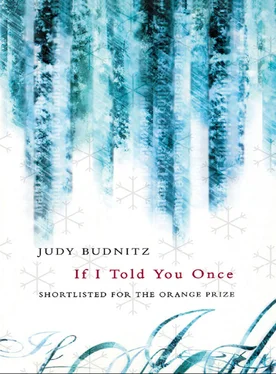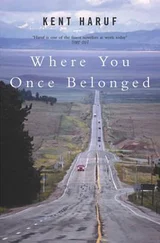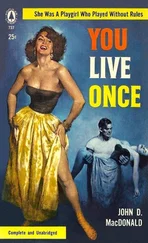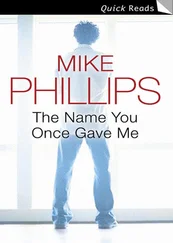I wanted to find my way there.
My grandmother and grandfather lived in a one-room house within sight of ours. I did not know how old my grandmother was. She did not know herself.
She and my grandfather were so accustomed to each other that a single word or gesture between them carried the meaning of whole conversations. They had shared a pillow for so long they had begun to look alike. They even seemed to have exchanged some of their aspects. My grandfather’s hair was long and white and hung in ringlets like a schoolgirl’s. My grandmother had once had hair like that. Now it was nearly gone, it covered her head in a thin soft down and she had a man’s thick strong hands.
Their trade was the preparation of leather, and it seemed the chemicals they used to preserve the animal hides had worked to preserve their skin as well.
My grandmother had taught my mother her knowledge of herbs. Sometimes they went gathering together. My grandmother always walked first and my mother followed behind her, placing her feet in the prints my grandmother had made in the snow. When I went with them I walked behind my mother, stepping in the footprints that my grandmother had made and my mother had deepened.
I remember that my grandfather had a high ridged nose, narrow and red. My grandmother always washed his feet for him, every evening before they went to sleep. His circulation was so slow that he could no longer feel it, but she performed the nightly ritual anyway. It had become a habit.
My grandfather died suddenly one day in spring, simply froze up at the table, spoon in midair, soup dripping from his chin. Wipe your mouth, my grandmother told him sharply. It was the first complete sentence she had spoken to him in twenty years.
What, do you mean to say you don’t like it? my grandmother asked when he did not move.
After all these years? Too salty? she asked. Why didn’t you tell me, she said and the tears began to trickle down her face and that was how we discovered them hours later, salty soup and tears dripping down their faces and plinking back in their bowls with a sound like rain.
My mother brought my grandmother to live in the house with us. Our house did not seem to agree with her; she spent her time running around the kitchen and yard barefoot in her nightgown, hurling stones and insults at imaginary foes. She’s grieving, she misses your grandfather, my mother told me. She’s ill, my mother said. But I had seen my grandmother lift my father’s ax and hack chunks out of the walls of our house. She did not seem sick at all, she was stronger than ever.
My father tried to keep her shut in the house, for her own protection. She scampered about the rafters and kept company with the rooster. She told the rooster long garbled stories as she stroked his red drooping comb. Stories of how she had been forced to marry at the age of nine; stories of her nineteen children and the deaths of eleven of them.
That’s not true, is it? She’s making it up, isn’t she? I asked my mother.
How would you know? my mother sniffed. Were you there?
My grandmother became afraid of the floor and would not leave her perch in the rafters. My mother tossed food up to her. My grandmother hoarded bread and kept the rooster tucked beneath her arm, sometimes vanishing for days at a time in dark places under the eaves.
One evening she unexpectedly descended, went to the door, and released the rooster. He misses his flock, she announced and watched him strutting and preening in the yard for a long while before she joined us at the table. She perched on a chair and I saw that her toes had grown as long and grasping as a monkey’s.
She looked at me then, seized my fist in her own, and said: You don’t believe me now, but one day you will. You’ll see. You’ll see what it’s like.
I pretended I did not know what she meant, though I did. Apparently she had missed nothing from her perch above our heads. I tried to talk of other things and drown her out.
She spoke calmly and lucidly all evening and helped scrape the dishes, and afterward she stretched out on the table to sleep, declaring that a hard bed was best for an old back.
I slept with my hands over my ears that night to shut out her snores.
The next morning we woke to find that she had barricaded herself into a corner of the room. She had taken her cache of bread, stale, weeks old, hard as stone, and stacked the loaves up like bricks all around her.
We could hear her within, the tiniest of breaths.
We tried to dismantle her cairn, chipped away at the hard gray bread for hours.
By the time we reached her she was no longer breathing, just a curled-up mass of arms and legs, a dry husk. Clutched in her lap we found the rooster, his claws clenched in her nightgown, one red eye frozen and empty.
It was a winter years later when I made my decision. I must have been about sixteen then, I think, about your age. My mother and I were wringing wet clothes, hanging them out to dry in the cold air, my mother hugely pregnant as usual. Snow gritty as dust stung our faces. I saw her pause, sniff her fingers, then inhale deeply. She looked around wildly and ran. She had smelled the gunpowder stink of approaching soldiers.
We followed, my brothers and sisters and I. We were all so occupied with helping our mother hide our father that we neglected Ari.
We forgot Ari, so the first thing the soldiers saw when they entered the village was my brother tearing a live sheep apart with his bare hands, not for sport but simply out of his rough love.
The soldiers on their recruiting mission had heard rumors of a boy with impossible brutelike strength, and they had searched far and wide for him. Though nothing was said about it we knew it was our disgruntled, worm-racked neighbors who must have told them where to find him.
The soldier captain watched Ari rip the sheep piece from piece, till it was nothing but bloody meat, and then Ari laid the pieces out, carefully lined them up. He was trying to put the animal back together, licking his fingers and crooning, cramming the limbs back into their sockets, breathing into the nostrils, trying to divine the clockwork that made it all move and bleat.
The captain watched, and his eyes gleamed; he clapped his hands, one of which was made of wood. His company of soldiers circled, and they wrapped my brother in iron chains which on his massive wrists and throat looked like flimsy jewelry, and they loaded him bawling into a cart to take him away to hone his special skills for the grand art of war, or so they said, and they tossed the chunks of sheep in after him, hoping to quiet him.
My mother ran from the house and chased after the departing cart, flinging curses at the soldiers, heaping them tenfold on their heads. The soldiers leaned down and jeered at her, with her swollen belly and waddling run. She spat at them, and one leaned down and dealt her such a blow that she fell in the mud and went into premature labor, right there in the street, before the eyes of all the men in the village.
For a single man to witness a birth was bad luck; for all the village men to witness it was such a bad omen that all the ensuing trouble that later befell the village was heaped on my mother; everyone said she was to blame for all that happened after and the village women never spoke to her again.
When all these things happened I knew it was time to leave.
Once upon a time, on a night when the houses lay buried to the eaves in snowdrifts and bits of ice danced on the wind, I left my village intending never to return.
Earlier that evening I had gone to bed in the back room with my brothers and sisters as usual. The others sighed and slept. I felt the warmth leave my fingers and feet.
I listened to my parents in their room. The bed frame creaked as my father sank down on it. I could picture him, his feet hanging off the end of the frame, head tipped back and the coarse beard sticking straight up.
Читать дальше












